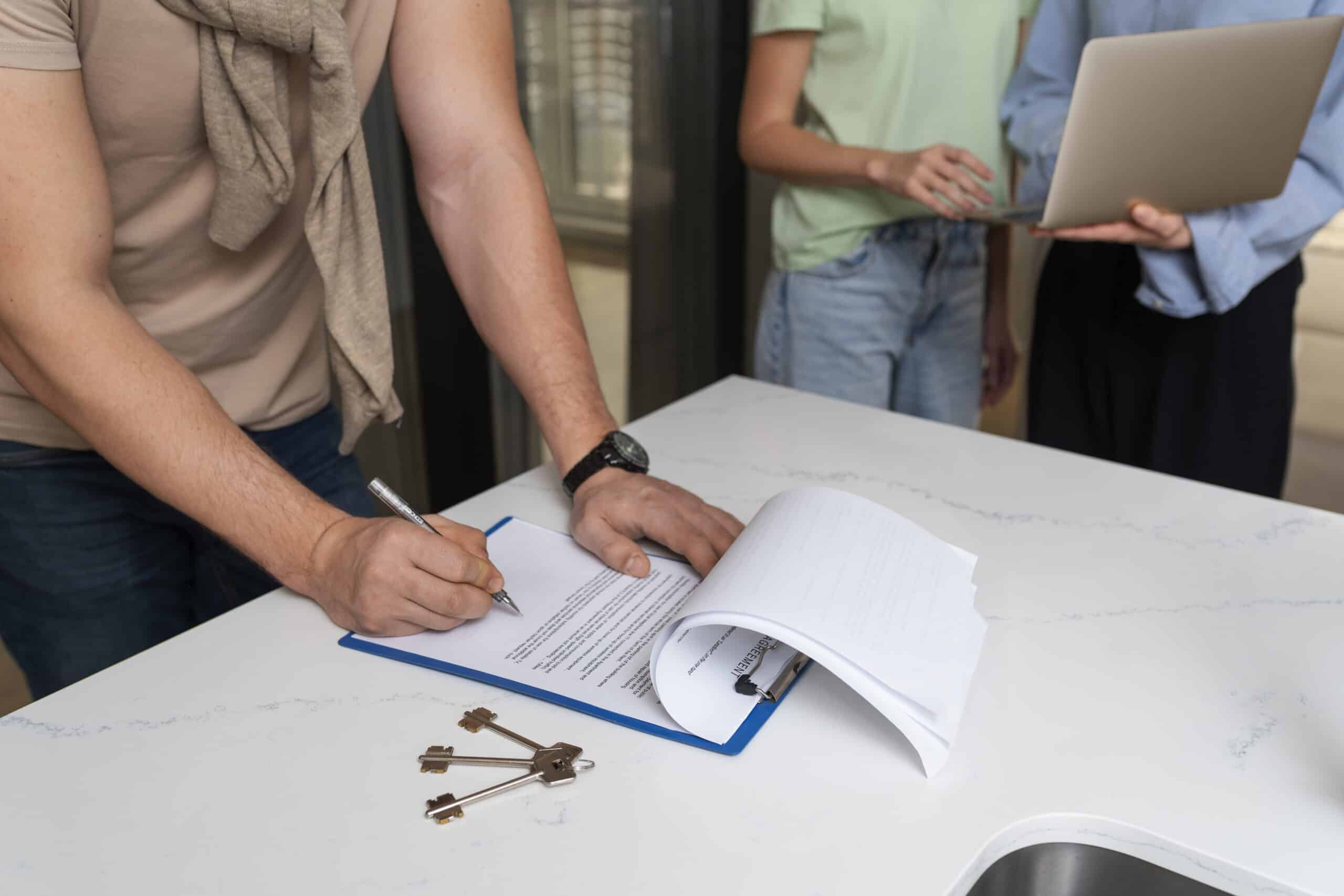Your property can be rented out for some extra income, but it can also be a bit nerve-wracking. You want to make sure your property is in good hands, and that means finding the right tenant. This process starts with one key step: tenant verification. Let’s dive into what that means and how it can benefit you.
Understanding Tenant Verification
Tenant verification is the process of making sure that the person you’re renting to is who they say they are and that they’ll be a good tenant. It involves checking the prospective tenant’s background, rental history, employment status, and sometimes their credit and criminal records. This might sound a bit daunting, but it’s essential for your peace of mind and the safety of your investment.
Imagine renting your property without really knowing anything about the person who will be living there. It would be a bit like letting a stranger into your home. Tenant verification helps remove that uncertainty by giving you a clear picture of who your tenant is. It helps you confirm their identity, ensure they have a reliable rental history, and check their ability to pay rent consistently.
Many landlords and property managers have been in situations where a tenant looked great on paper but turned out to be a nightmare to deal with. They might not pay rent on time, they could damage the property, or worse, they might cause trouble with neighbors or the law. Tenant verification helps prevent these issues by filtering out potential tenants who might not be suitable for your property.

Smarter Pest Control, Fewer Headaches.
The Importance of a Verified Tenant
Having a verified tenant can make all the difference between a successful rental experience and a stressful one. Let’s talk about why having a verified tenant is so important for landlords and property managers.
First, there’s the financial aspect. A verified tenant is more likely to pay rent on time, every time. This means a steady income stream for you, with less worry about late payments or missed rent. When you verify a tenant, you’re checking that they have the financial stability and history to meet their rental obligations. This is crucial because it minimizes the risk of financial loss and helps ensure you can cover your property expenses, like mortgage payments and maintenance costs.
Second, verified tenants tend to take better care of the property. When you’ve done your homework and selected a responsible tenant, they’re more likely to respect the rules of the lease agreement and treat the property as if it were their own. This means fewer repair bills and less wear and tear on your property. By verifying your tenants, you’re protecting your investment and ensuring that your property remains in good condition for future renters.
Lastly, there’s the matter of peace of mind. Knowing that you’ve selected a reliable tenant can help you rest easy. You won’t have to worry as much about potential problems down the road, such as disputes over rent or damage to the property. With a verified tenant, you can feel more confident that you’ve chosen someone who will be a good neighbor and a positive addition to your community.
Steps to Verify Tenant Identification
Now that we understand the importance of having a verified tenant, let’s look at how you can verify tenant identification. This is one of the first and most crucial steps in the tenant verification process. You’ll want to make sure that the person applying for your rental property is indeed who they claim to be.
Start by collecting essential identification documents from your prospective tenant. This typically includes a government-issued ID, like a driver’s license or passport, and their Social Security Number. These documents are important because they provide the basic information you need to verify the tenant’s identity.
Once you have the necessary documents, take the time to verify their authenticity. Look for signs that the ID is legitimate, such as holograms or watermarks, and check that the information matches what the tenant has provided on their application. If something doesn’t look right, don’t hesitate to ask for additional documentation or clarification.
In today’s digital age, technology can be a valuable tool in tenant verification. There are services available that can help you confirm the identity of your prospective tenant quickly and efficiently. These services often use advanced databases to cross-reference the information provided by the tenant, ensuring it matches public records. Using these services can save you time and effort while giving you confidence that you’re working with accurate information.
How to Verify Rental History
Verifying a prospective tenant’s rental history is like checking their track record. It’s an essential step to ensure that they have been good tenants in the past. A solid rental history can give you peace of mind that your property will be in good hands.
Start by asking for references from previous landlords. This is a simple but effective way to gather information about your potential tenant. Contact the landlords and ask them specific questions about the tenant’s behavior and responsibilities. Did they pay rent on time? Did they take care of the property? Were there any issues or complaints during their tenancy? These questions can give you a better idea of the tenant’s behavior and reliability.
In addition to contacting previous landlords, you should review the tenant’s past rental agreements. This can help you verify the length of their previous tenancies and whether they adhered to the terms of their leases. Pay attention to any early lease terminations, as this might be a red flag indicating potential issues.
It’s also wise to check for any eviction history or rental disputes. You can use online databases to see if your prospective tenant has been involved in any legal disputes related to their tenancy. This can help you identify any patterns of problematic behavior that could affect your decision.
A verified renter with a positive rental history is more likely to be a good fit for your property. By taking the time to verify rental history, you can reduce the risk of future issues and ensure a smooth rental experience.
Checking Employment and Income
Another crucial step in the tenant verification process is checking the prospective tenant’s employment and income. This ensures that they have the financial stability to meet their rental obligations. You want to be confident that your tenant can afford the rent and will pay it on time each month.
Start by requesting an employment verification letter from their employer. This letter should confirm their job title, length of employment, and income. It’s important to ensure that the tenant has a stable job and sufficient income to cover the rent. You can also ask for recent pay stubs as additional proof of income.
Understanding a tenant’s income-to-rent ratio is also vital. A general rule of thumb is that the tenant’s monthly income should be at least three times the rent amount. This ensures that they have enough financial cushion to cover other living expenses and unexpected costs. If a tenant’s income is significantly lower, it might be a sign that they’ll struggle to meet rent payments consistently.
Sometimes, tenants might not have a traditional income source, such as freelancers or self-employed individuals. In these cases, ask for additional documentation, like bank statements or tax returns, to verify their income.
A thorough check of a tenant’s employment and income helps you assess their financial stability and ability to afford your rental property. It gives you confidence that you’re choosing a tenant who can meet their financial commitments.
Conducting a Credit Check
Conducting a credit check is another vital part of tenant verification. It provides insights into a prospective tenant’s financial habits and helps you assess their reliability. A credit check can reveal if a tenant has a history of paying bills on time or if they have struggled with financial responsibilities.
To conduct a credit check, you’ll need the tenant’s consent and Social Security Number. There are many credit reporting services available that can provide you with a detailed credit report. This report includes information about the tenant’s credit score, outstanding debts, and payment history.
A good credit score is a positive indicator of a tenant’s financial responsibility. It shows that they have a history of paying bills on time and managing their finances well. However, a lower credit score doesn’t necessarily mean the tenant will be a bad renter. It’s important to look at the bigger picture and consider other factors like rental history and income.
When reviewing a credit report, pay attention to any red flags such as outstanding debts, frequent late payments, or recent bankruptcies. These could indicate financial instability or a lack of responsibility in managing money. On the other hand, a consistent payment history and low debt levels are positive signs that the tenant is likely to meet their rental obligations.
It’s important to remember that everyone faces financial challenges at some point, so use the credit check as one part of your overall assessment. Combining this information with rental history and income verification can give you a comprehensive view of your prospective tenant’s reliability and suitability.
Criminal Background Checks
Conducting a criminal background check is an important step in the tenant verification process. This helps ensure the safety of your property and the surrounding community. It’s important to know if a potential tenant has a history that could affect their ability to be a good neighbor or take care of your property.
You can use online services to perform a criminal background check. These services can provide you with detailed information about any past criminal convictions or legal issues. Keep in mind that you need the tenant’s permission to conduct this check, and you should always comply with local laws and regulations regarding background checks.
When reviewing a criminal background check, focus on serious offenses that might impact your property or other tenants, like violent crimes or theft. Minor offenses from many years ago might not be relevant, but serious or recent criminal activity can be a red flag.
It’s important to balance safety with fairness. Not everyone with a criminal record will be a problematic tenant, so consider the context and nature of any offenses. Use this information as part of your overall assessment, not as the sole deciding factor.
Interviewing Prospective Tenants
Interviewing prospective tenants is a valuable part of the verification process. It gives you a chance to meet the tenant face-to-face and ask any questions you have. This personal interaction can help you get a feel for their character and determine if they would be a good fit for your property.
During the interview, ask questions about their rental history, why they’re moving, and what they’re looking for in a rental property. This is also a good opportunity to discuss any rules or expectations you have as a landlord, such as pet policies or maintenance responsibilities.
Watch for any red flags during the interview, like evasive answers or inconsistencies in their story. Trust your instincts, as a face-to-face meeting can sometimes reveal things that paperwork cannot.
The Role of Tenant Screening Services
Tenant screening services can make the verification process much easier and more efficient. These services offer comprehensive background checks, including credit, criminal, and rental history, all in one package. They can save you time and ensure you’re getting accurate and up-to-date information.
Using a tenant screening service is especially helpful if you have multiple properties or a large number of applicants. These services are designed to streamline the process and help you make informed decisions quickly.
When choosing a tenant screening service, look for one that offers a complete range of checks and has a good reputation. Check reviews and see if other landlords have had positive experiences with the service. By partnering with a reliable service, you can feel confident that you’re making the right choice for your property.
Legal Considerations and Fair Housing Laws
Finally, it’s important to understand the legal aspects of tenant verification. As a landlord, you must comply with Fair Housing Laws, which prohibit discrimination based on race, color, national origin, religion, sex, familial status, or disability. Make sure your tenant verification process is fair and consistent for all applicants.
Avoid making decisions based on personal biases or stereotypes. Instead, focus on factual information and objective criteria, like rental history, income stability, and creditworthiness.
Be aware of tenant rights and your responsibilities as a landlord. Ensure you handle sensitive information like social security numbers and personal data with care, protecting your tenant’s privacy throughout the process.
Ensuring you have a verified tenant for your rental property is key to a successful rental experience. By following these steps, you can confidently select a tenant who will respect your property and contribute positively to your rental community. Take the time to verify identity, rental history, employment, and more to protect your investment.







